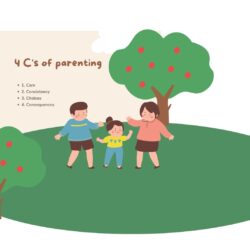Growing up with strict parents can be quite challenging. On the one hand, you know they only want the best for you, but on the other hand, their overbearing ways can put a strain on your relationship. It’s important to recognize the hallmarks of strict parenting and the effects it can have on children. By understanding these dynamics and learning how to navigate them, both parents and children can establish a healthy and positive relationship. Let’s dive deeper into this topic and explore how we can address the challenges that come with strict parents.
Characteristics of Strict Parents:

- High Expectations and Demands: Strict parents often set rigorous standards for their children’s academic performance, behavior, and future goals. These expectations can be relentless and leave little room for mistakes or individual preferences.
- Limited Autonomy and Control: Decisions, from extracurricular activities to career choices, might be heavily influenced or dictated by the parents, leaving children with a diminished sense of agency and control over their own lives.
- Strict Rules and Discipline: A rigid set of rules and harsh disciplinary measures are often employed to enforce compliance and obedience.
- Focus on Obedience Over Open Communication: Open communication and expressing feelings might be discouraged, creating a dynamic where children prioritize obeying rules over communicating their needs and perspectives.
- Conditional Love and Approval: Love and acceptance may be contingent on meeting the parents’ expectations, fostering feelings of inadequacy and insecurity in children.
Potential Impacts of Strict Parenting:
While strict parenting might aim to instill discipline, responsibility, and academic success, its impact on children can be multifaceted, with both positive and negative consequences:

Positive Impacts (when implemented in a balanced and nurturing way):
- Strong Work Ethic and Discipline: Strict expectations can develop a strong work ethic and the ability to persevere through challenges.
- Academic Achievement: Pressure to excel can motivate some children to achieve academically.
- Respect for Authority: Strict parents often emphasize respect for authority figures, which can be beneficial in certain situations.
Negative Impacts:
- Low Self-Esteem and Self-Confidence: Constant criticism and conditional love can negatively impact self-esteem and create feelings of inadequacy.
- Anxiety and Depression: The pressure to meet unrealistic expectations can lead to anxiety, depression, and feelings of overwhelming stress.
- Rebellion and Secrecy: Lack of open communication might lead children to rebel or engage in secretive behavior to avoid parental disapproval.
- Difficulty with Independence and Decision-Making: Limited autonomy can hinder the development of independent thinking and decision-making skills.
- Strained Parent-Child Relationships: Constant conflict arising from rigid rules and lack of emotional connection can damage the parent-child bond.
Navigating the Dynamics
For Parents:
- Self-reflection: Reflect on your parenting style and its potential impact on your child.
- Open Communication: Foster open communication and create a safe space for your child to express their feelings and opinions.
- Set Realistic Expectations: Set realistic and achievable expectations that consider your child’s strengths and weaknesses.
- Positive Reinforcement: Focus on praising good behavior and effort rather than solely focusing on punishment.
- Nurture Autonomy: Gradually grant your child more autonomy and control over their lives as they mature.
- Seek Professional Guidance: If struggling, consider seeking professional guidance from a therapist or counselor who can help navigate communication and establish healthier parenting strategies.
For Children:
- Open Communication: As much as possible, strive for open and honest communication with your parents. Express your feelings and perspectives clearly and respectfully.
- Negotiation and Compromise: Learn to negotiate and compromise with your parents. Propose alternatives while acknowledging their concerns.
- Setting Boundaries: If necessary, learn to set healthy boundaries with your parents to protect your mental well-being and sense of self.
- Seek Support: Don’t hesitate to seek support from trusted adults like teachers, counselors, or other family members if you’re facing challenges communicating with your parents.
- Focus on Your Goals: Maintain focus on your own goals and aspirations while acknowledging your parents’ perspective. Remember, your journey and happiness are important.
Conclusion
Parenting can be challenging but also rewarding. While strict parenting can have good intentions, it’s important to recognize that it may have negative effects. It’s best to create a balance between setting clear boundaries, nurturing individual growth and autonomy, and fostering open communication. To navigate the complex dynamic of parent-child relationships, open communication and a willingness to adapt are key. Remember, creating a healthy and supportive parent-child relationship is the ultimate goal.





